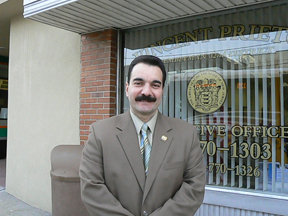The fate of the state’s weeks-old medical marijuana law is now in the hands of new Gov. Chris Christie, who has said for the past year that he a problem with the legislation.
Although the legislation passed both houses in the state legislature and was signed by former Gov. Jon Corzine earlier this month, the law currently has no funding and will need several million dollars to get off the ground. Funding for the law rests with Christie, who has promised to slash state spending and address New Jersey’s $8 to $10 billion structural deficit.
Given the current financial constraints, there is some doubt that Christie will put money behind this law, particularly because the governor doesn’t like the language of it. On the campaign trail last year, Christie said he supports the concept of medical marijuana use, but didn’t like either of the pot bills that were moving through Trenton.
There would be six certified pot dispensaries scattered throughout the state.
________
Co-sponsored by local resident
New Jersey’s medical marijuana law was co-sponsored by Assemblyman Vincent Prieto (D-32 Dist.), a Secaucus resident who represents several local towns. It is the fourteenth law of its kind in the country.
“You have other controlled substances that are prescribed, regulated, and still given to patients who need them,” said Prieto last week. “You have codeine, you have morphine. These drugs are used to alleviate some symptoms. If we have another drug that can alleviate suffering, we should put it to good use.”
Under the proposed New Jersey law, there will be six certified pot dispensaries scattered throughout the state.
“Only people with chronic diseases will be able to get a prescription.” – Vincent Prieto
________
These pot centers will be run as nonprofits. Should the program be expanded and new dispensaries approved, future centers won’t have to be nonprofits.
Doctors will have to be certified to prescribe marijuana to their patients – and only a very limited number of patients will be eligible.
Limited few
While most states with medical marijuana laws on the books allow use for chronic pain, the New Jersey limits its use for that purpose. Here, only patients suffering from a short list of specific diseases can be prescribed pot for medicinal use. Patients with cancer, glaucoma, advanced amyotrophic lateral sclerosis (ALS), seizure disorders, and Acquired Immune Deficiency Syndrome (AIDS) are among those who can be prescribed medicinal pot. But people with third-degree burns or chronic pain from injuries or surgery are out of luck.
“Only people with chronic diseases will be able to get a prescription,” Prieto said, “and patients won’t be allowed to grow it themselves. They’ll have to get it from the dispensaries…and patients will have to consume it at home.”
Under the law, people will be allowed up to two ounces of the drug per month – an amount far less than what’s allowed under other similar laws elsewhere around the country.
Caregivers tending to people too sick to travel to a dispensary are allowed to pick up prescriptions for patients, but will require state approval to do so and will have to clear a background check.
Avoiding California’s problems
California’s medical marijuana law, which was approved by voters in 1996, is often regarded as a lax piece of legislation that was too open to abuse. For example, in Los Angeles, which has its own ordinance, there are an estimated 800 to 1,000 unregulated dispensaries, many in residential neighborhoods. Even the regulated dispensaries have little regulation about who picks up the drug. Last week, the Los Angeles City Council approved an ordinance capping the number of pot dispensaries at 70. Dispensaries must be at least 1,000 feet from such places as schools, parks, and playgrounds.
“There have been a lot of downsides to marijuana laws in California,” said Joseph Olszewski, chief of staff for Assemblyman Anthony Chiappone (D-31st Dist.), another co-sponsor of the bill. Olszewski worked closely with Chiappone to help craft the Assembly’s version of the marijuana bill. “There’s very little regulation there, which is one of the reasons they’ve had problems.”
Changes ahead
New Jersey’s medical marijuana law is already considered one of the toughest in the nation, so it’s unclear what further restrictions Gov. Christie, who thinks it’s too lenient, might impose.
“Our law differs very much from the California law,” Prieto said. “Since we’re the fourteenth state [to legalize medical marijuana use], we actually looked at a lot of other states to see what problems they had… This is a good piece of legislation.”
But Olszewski speculated that “A lot of amendments will be added. You want to close the loopholes.” He said Assemblyman Chiappone will introduce an amendment that calls for the creation of a 24-hour database of people who have legal prescriptions for marijuana.
“This database will be accessible to anybody in law enforcement,” added Olszewski, who has a background in law enforcement. “And people [with prescriptions] will have to waive their [medical privacy] rights” to be included. But the database would not include patients’ specific medical diagnoses.
Other amendments will likely increase penalties for those who violate the law, Olszewski added.
If funded, the law is scheduled to go into effect in June, but that could be postponed.
E-mail E. Assata Wright at awright@hudsonreporter.com.
